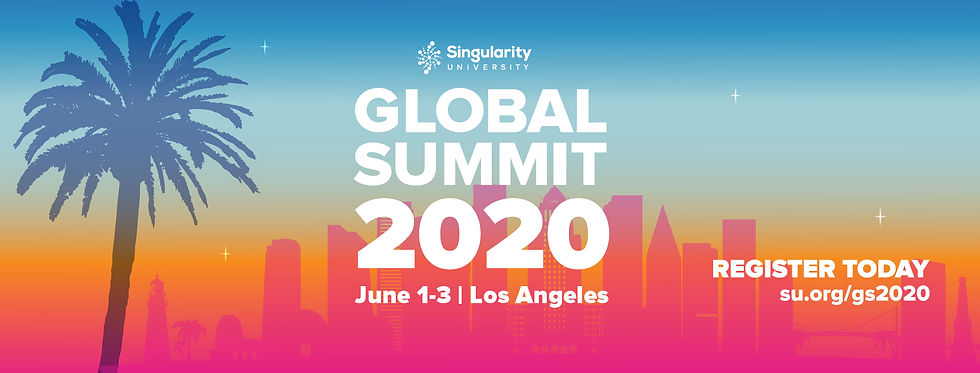Exponential Leadership for a Better World
- Sep 3, 2019
- 4 min read
Updated: Jan 18, 2020
Key takeaways from Singularity University Global Summit–2019
Imagine you go to the gym that awards you every time you show up; or visiting a comedy theater that does not charge you for a ticket but per your laugh using facial-recognition technology to track how much you enjoyed the show; or perhaps the smart yoga pants fixing your poses through small sensors on the clothes and telling whether you are in the right position.
‘The Behavioral Shaper’ is just one of the innovative business models that Amin Toufani, the CEO of T Labs, covered during his presentation at Singularity University Global Summit-2019. This insightful conversation happened in San Francisco mid-August and convened thousands of innovators and changemakers who take action for a better and more inclusive world.
"The biggest risk is not thinking big enough."
Amin Toufani, who graduated from Harvard and Stanford, believes that if we could overcome the crisis of imagination, and instead cultivate exponential, out-of-box thinking, some “magical things will happen.” His philosophy? “Intelligence is hitting a target that nobody else can. Genius is hitting a target that nobody else can see.” Why wait for 3500 years to invent the new wheel? The business models presented by Amin Toufani became an exceptional hands-on call to action towards thinking differently for solutions impact.
Network effects; building “uncommon” partnership
Creating and selling products or services is not enough today. A customer demands performance. In today’s world, you cannot improve performance just being one dimensional. That’s why we see the remarkable rise of platforms becoming valued bridges between the different sides of the markets. These platforms are evolving into ecosystems like Amazon, where different websites are interlinked. In the next decade, we will see an evolution towards the ‘operating system.’ Amin assumes that Facebook’s Libra is a first attempt to create invisible operating space that will redefine financial systems and probably will create the next version of the Internet, where accountability will be provided via Blockchain; automation via Artificial Intelligence; and optimization via Quantum Computing.
Attention is currency; drawing attention to what matters
The greatest challenge will continue to be fighting for consumers' attention. The information does not equal knowledge. That’s why technologies with the summary engine, converting an abundance of information into actionable insights, are on the rise. The best and simplest example is Get Abstract, the world’s largest collection of book summaries, or Talk To Books, a Google project, that reads thousands of books in a second and browses passages using experimental Ai.
The above examples are positive outcomes of the Attention Economy. But what’s behind? In the era of social media, it is getting easier to monetize attention. As an example, the salary of Kim Kardashian, the infamous Instagram celebrity, equals fifteen hundred scientists; fifteen hundred engineers and fifteen hundred teachers working for an entire year. Nothing wrong about Kim Kardashian; there is something wrong with our “value-distributed” mechanism. How to draw attention to what matters is a challenge, and to address this challenge we need to upgrade our collective imagination. Amin believes the same “attention” engines could be applied in every field to shed light on major societal issues we need to fix.
Gap minder; innovating by solving problems
“We’re quite excited to see the emergence of the next exponential business model. We call it the gap minder model. This is where businesses are focused on the delta, the gap between the world that we have and the world that we want. The main areas are upward mobility; rights and freedoms; distribution of opportunity; wellness of the planet,” said Amin. “And this is truly powerful, and it is gaining a lot of momentum, both with businesses that are gap minder but also with regular businesses that pay attention to the gap.”
As another great example: a Swedish Fintech company Doconomy launched a credit card that tracks the carbon dioxide emissions with every transaction and also sets a limitation on the user’s spending to help decrease the impact on climate change. The company built its value proposition not around low fees and 'gold-platinum' customer service. They offer a banking service with a conscious where spending and savings are measured by its impact on the planet, whether negative and positive.
Even donations are no longer considered as a passive act. Kiva, an international nonprofit founded in 2005 in San Francisco, offering a unique and life-changing concept to support individuals in underserved communities. The loans can be as small as $25, and projects are crowdfunded, so each loan involves multiple lenders. The repayment rate is 97 percent. Those who participate can see their small contributions spark a social impact movement, with absolute financial and social inclusion across the globe – such as a fabric business in India, funded with a $570 loan, or a thriving farm in Peru, crowdfunded with $450.
What do we need for exponential leadership? Accountability towards yourself (when you commit to making something happen, - and you make it happen); “uncommon” partnership (business, government, startups, academic institutions, social leaders, investors), and a positive mindset. As SU’s academic board concluded, “We are living during the most amazing time ever to be alive. Don’t blink!”

















Comments